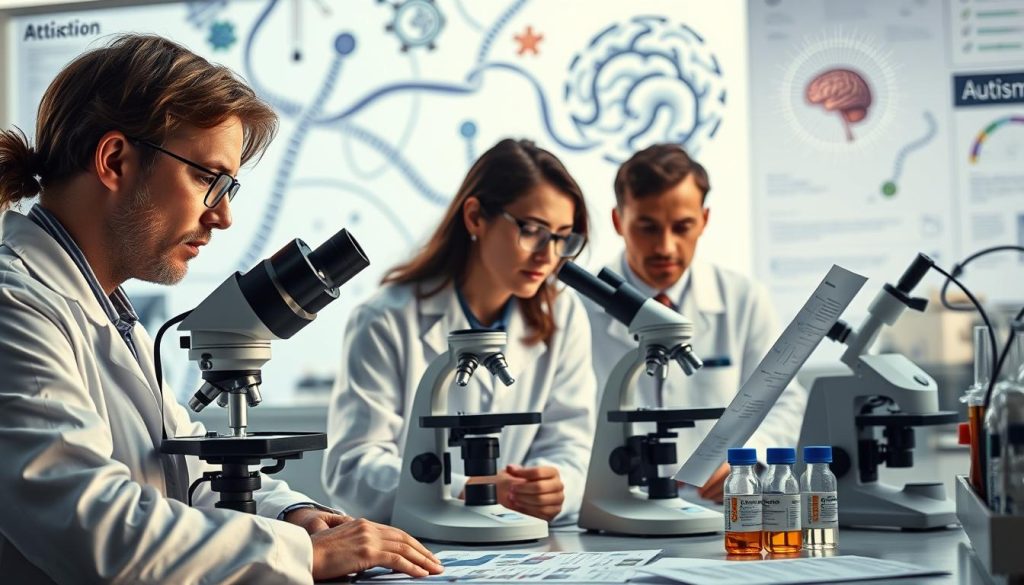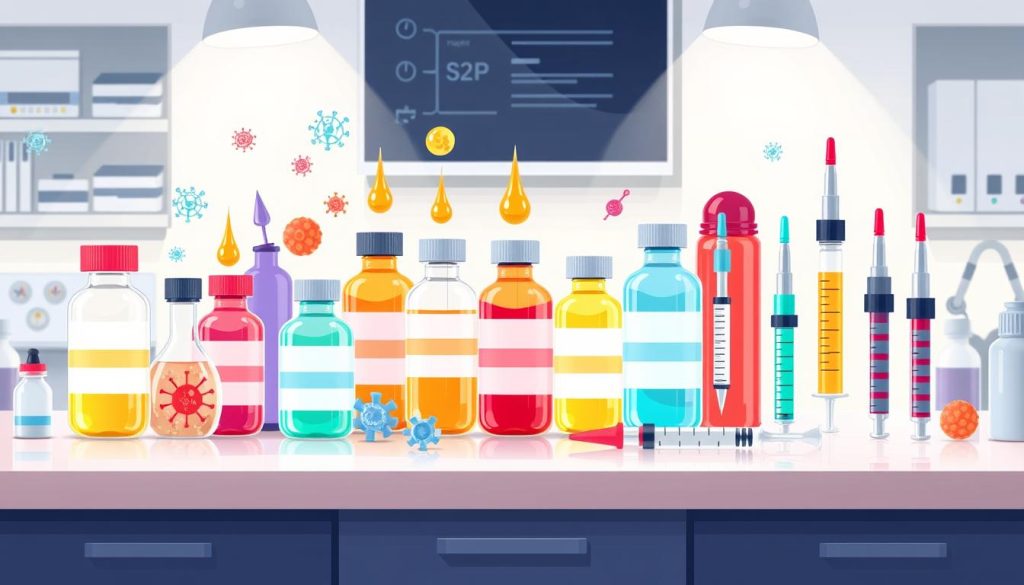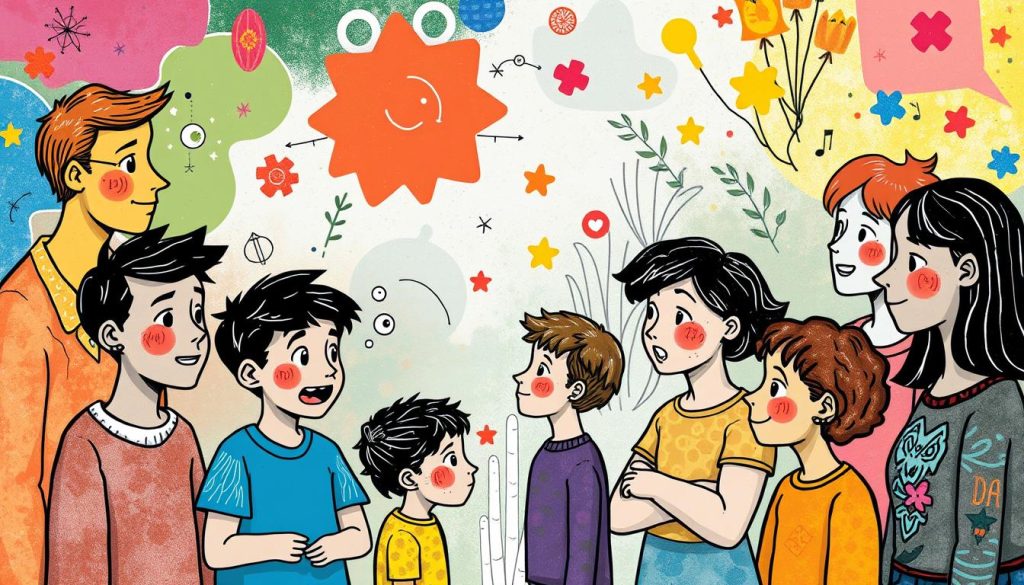Vaccines have been a hot topic in recent years. They’ve sparked debates about their safety and links to autism spectrum disorder. This article looks into the facts and expert research on childhood immunizations and autism.
We’ll dive into the scientific evidence on vaccine safety. We’ll also debunk common myths and offer valuable info for parents. By looking at large-scale studies and expert opinions, we aim to shed light on this important issue.
In this article, we’ll tackle key questions about the vaccine-autism controversy. We’ll discuss the latest research findings and explain how vaccines protect our communities. Let’s separate fact from fiction and give readers accurate, science-based information.
Understanding the Vaccine-Autism Controversy: Historical Background
The debate over vaccines and autism has lasted for years. This look back shows how false information about vaccines started and grew the anti-vax movement.
The Origins of the Vaccine-Autism Hypothesis
In the late 1990s, people started to wonder if vaccines could cause autism. Parents saw changes in their kids after shots, leading to worries and doubts. These early concerns started a big debate.
The Retracted 1998 Study
A 1998 study in The Lancet said the MMR vaccine might cause autism. This flawed research caused a lot of fear and led to fewer kids getting vaccinated. The study was later taken back because of ethical issues and fake data.
Impact on Public Health Perspectives
The study’s retraction had big effects. It made more people doubt vaccines and spread false info worldwide. This led to outbreaks of diseases that could be stopped by vaccines in some places.
| Year | Event | Impact |
|---|---|---|
| 1998 | Publication of Wakefield study | Widespread concern about MMR vaccine |
| 2004 | Partial retraction of study | Doubts about study’s validity emerge |
| 2010 | Full retraction of Lancet paper | Scientific community rejects vaccine-autism link |
| 2011-present | Ongoing research and education efforts | Gradual rebuilding of public trust in vaccines |
Knowing this history helps us fight vaccine doubts and stop false info about vaccine safety today.
Do Vaccines Trigger Autism: Examining the Scientific Evidence
The question “do vaccines trigger autism” has sparked intense debate in recent years. Scientists have conducted extensive research to investigate this claim. Their findings consistently show no link between vaccines and autism.
Large-scale studies involving millions of children have found no increased risk of autism from vaccines. For example, a study of over 650,000 Danish children found no difference in autism rates between vaccinated and unvaccinated groups.

Researchers have also examined possible vaccine side effects in relation to autism. While mild side effects like soreness or low-grade fever can occur, no evidence supports vaccines causing autism. The timing of early childhood vaccines and typical autism diagnosis age has led to misconceptions about a connection.
| Concern | Scientific Evidence |
|---|---|
| Vaccines cause autism | No link found in numerous large studies |
| Vaccine ingredients harmful | Ingredients rigorously tested for safety |
| Too many vaccines overload immune system | No evidence of immune system harm from multiple vaccines |
The scientific consensus remains clear: vaccines do not trigger autism. Ongoing research continues to support vaccine safety while exploring the complex factors contributing to autism spectrum disorders.
The Science Behind Vaccine Safety and Development
Vaccine safety is a top priority in medical science. The journey from lab to clinic involves rigorous testing and careful monitoring. Let’s explore how vaccines work and the steps taken to ensure their safety.
How Vaccines Work in the Body
Vaccines train our immune system to fight specific diseases. They contain weakened or inactive parts of a germ. When introduced to the body, these parts trigger an immune response.
This response creates memory cells that remember how to fight the disease in the future.
Vaccine Testing and Approval Process
Before any vaccine reaches the public, it goes through strict testing. This process often takes years and involves multiple phases:
- Lab testing
- Animal studies
- Human clinical trials
- FDA review and approval
Each step ensures the vaccine is safe and effective. Only after passing all these tests can a vaccine be used for childhood immunizations.
Quality Control Measures
Even after approval, vaccine safety monitoring continues. Manufacturers and health agencies use various methods to track vaccine performance and side effects. These include:
- Batch testing
- Post-market surveillance
- Ongoing safety studies
These measures help maintain high standards for vaccine safety. They also allow for quick responses to any issues that may arise.
Common Vaccine Ingredients and Their Functions
Vaccines are vital for keeping us safe. It’s important to know what’s in them. Let’s look at the usual parts of vaccines and why they’re there.

Vaccines have different ingredients, each with its own job. The main part is the antigen. It gets the immune system ready to fight off bad germs later.
Adjuvants help the immune system work better. This means we need less antigen. Preservatives keep the vaccine clean, and stabilizers keep it strong when it’s stored or moved.
| Ingredient | Function | Examples |
|---|---|---|
| Antigen | Stimulates immune response | Inactivated viruses, bacteria |
| Adjuvants | Enhances immune response | Aluminum salts |
| Preservatives | Prevents contamination | Thimerosal (in some flu vaccines) |
| Stabilizers | Maintains vaccine potency | Sugars, gelatin |
Vaccine safety is a top priority. The FDA and CDC check vaccines closely. They make sure vaccines are safe and work well.
Large-Scale Studies Debunking the Vaccine-Autism Link
Scientists have looked into whether vaccines cause autism. Many big studies have shown no link between vaccines and autism. Let’s look at some key findings that show vaccines are safe.
Danish Population Study Results
A big Danish study looked at over 650,000 kids born from 1999 to 2010. It found no higher risk of autism in kids who got vaccines. This study was a strong proof against the vaccine-autism link.
CDC Research Findings
The Centers for Disease Control and Prevention (CDC) has done a lot of research on vaccine safety. CDC’s advice comes from solid research. One study on the MMR vaccine and autism in over 95,000 kids found no link. This was true even for kids with autistic siblings.
International Research Consensus
Scientists all over the world agree: vaccines don’t cause autism. A 2014 review of 10 studies, with over 1.2 million kids, found no vaccine-autism link. This worldwide agreement shows how important and safe vaccines are.
| Study | Participants | Findings |
|---|---|---|
| Danish Population Study | 650,000+ children | No increased autism risk in vaccinated children |
| CDC MMR Vaccine Study | 95,000+ children | No link between MMR vaccine and autism |
| International Review | 1.2+ million children | No relationship between vaccines and autism |
Understanding Autism Spectrum Disorder (ASD)
Autism spectrum disorder (ASD) is a complex condition that affects how people communicate and behave. It’s important to know about ASD to clear up myths about its causes, like vaccine side effects.

ASD usually shows up in early childhood and lasts a lifetime. The term “spectrum” means there’s a wide range of symptoms and how severe they can be. Some people with ASD need a lot of support, while others can live on their own.
Common signs of autism spectrum disorder include:
- Difficulty with social communication and interaction
- Repetitive behaviors or interests
- Sensory sensitivities
- Challenges with verbal and nonverbal communication
The Centers for Disease Control and Prevention (CDC) says about 1 in 36 children in the U.S. have ASD. It’s important to know that research has found no link between ASD and vaccine side effects.
| Characteristic | Description |
|---|---|
| Social Interaction | Difficulty understanding social cues and maintaining relationships |
| Communication | Challenges with verbal and nonverbal communication |
| Behavior | Repetitive actions or intense interests in specific topics |
| Sensory Processing | Heightened or reduced sensitivity to sensory input |
Getting a diagnosis early and starting treatment can really help people with ASD. As we learn more, we can offer better support and resources for those affected.
Genetic and Environmental Factors in Autism Development
The causes of autism spectrum disorder are complex. Researchers are finding both genetic and environmental factors. This knowledge helps us understand autism and eases worries about vaccine safety.
Current Research on Autism Causes
Studies show autism has a strong genetic link. Over 100 genes may raise autism risk. These genes impact brain development and cell communication.
Prenatal Development Factors
The prenatal period is key for brain growth. Maternal infections, certain meds, and toxins may affect autism risk. Older parents also face a slightly higher risk.
Environmental Risk Factors
After birth, a child’s environment shapes their brain. Researchers look at air pollution, diet, and early life experiences. Studies show no link between vaccines and autism, highlighting vaccine safety.
Learning about these factors guides future research and support. As we uncover more, we can improve interventions and support systems for those with autism.
The Role of CDC in Vaccine Safety Monitoring
The Centers for Disease Control and Prevention (CDC) is key in keeping vaccines safe in the U.S. They use strict monitoring and research to protect health and keep trust in vaccines.

CDC gives advice on safe vaccine use. Their advice comes from solid science and is updated often.
The CDC uses several ways to watch vaccine safety:
- Vaccine Adverse Event Reporting System (VAERS)
- Vaccine Safety Datalink (VSD)
- Clinical Immunization Safety Assessment (CISA) Project
These tools help the CDC track side effects and study vaccine safety. They look at data from millions of doses to spot and fix safety issues fast.
| Monitoring System | Function |
|---|---|
| VAERS | Collects reports of adverse events following vaccination |
| VSD | Analyzes health data from participating healthcare organizations |
| CISA | Conducts clinical research on vaccine safety |
The CDC does more than just watch for safety issues. They fund studies, work with other countries, and teach health workers and the public. This all-around effort makes vaccines a safe and powerful way to fight disease and keep people healthy.
Vaccine Safety Monitoring Systems and Reporting
The US has strong systems to track vaccine side effects and ensure safety. These systems help keep public trust and guide CDC recommendations for vaccines.
VAERS System Overview
The Vaccine Adverse Event Reporting System (VAERS) is a key tool for monitoring vaccine safety. It lets healthcare providers and the public report health issues after vaccination. This system helps find rare side effects that might not show up in clinical trials.
VAERS data is analyzed by experts to spot safety concerns. Anyone can report an issue, but not all are caused by vaccines. The CDC uses this info to guide research and update vaccine advice as needed.
Post-Marketing Surveillance
After vaccines are approved, ongoing monitoring continues through post-marketing surveillance. This includes:
- Large-scale studies tracking vaccinated populations
- Analysis of health records to detect unusual patterns
- Collaboration with international health organizations
These efforts help quickly spot rare side effects. The CDC regularly reviews this data to ensure vaccine benefits outweigh risks. This constant watch helps keep the US immunization program safe and effective.
Impact of Anti-Vaccination Movement on Public Health

The anti-vax movement has grown in recent years, worrying health officials. It has led to fewer people getting vaccinated. This puts communities at risk of disease outbreaks.
One big worry is the return of diseases we thought we’d beat. Measles is back in places where not enough people are vaccinated. It spreads fast in areas where not everyone is protected.
This movement also weakens herd immunity. Herd immunity means most people in a community are immune to a disease. This makes it hard for the disease to spread. But when fewer people get vaccinated, this barrier gets weaker. Everyone then becomes more at risk of getting sick.
| Disease | Vaccination Rate for Herd Immunity | Current US Vaccination Rate |
|---|---|---|
| Measles | 95% | 91.5% |
| Polio | 80-85% | 92.7% |
| Whooping Cough | 92-94% | 80.8% |
The table shows how far we are from the vaccination rates needed for herd immunity. For some diseases, we’re not even close. This gap makes communities more vulnerable to outbreaks. It shows the real harm the anti-vax movement does to public health.
Understanding Herd Immunity and Community Protection
Herd immunity is key to keeping communities safe from diseases. It’s linked to childhood vaccines and their effect on health. Let’s dive into how it works and the vaccination rates needed.
How Herd Immunity Works
Herd immunity happens when most people in a group are immune to a disease. This is often thanks to vaccines given in childhood. It acts as a shield, slowing or stopping disease spread.
As more people get vaccinated, those who can’t are less exposed to the disease. This is a big win for public health.
Vaccination Rate Thresholds
For herd immunity to work, certain vaccination rates are needed. These rates change based on how contagious a disease is. Here are some common ones:
| Disease | Vaccination Rate Threshold |
|---|---|
| Measles | 95% |
| Polio | 80-85% |
| Mumps | 75-86% |
| Influenza | 33-44% |
Reaching these vaccination rates is vital for community safety. If rates drop, disease outbreaks can happen. This puts those most at risk in danger.
By supporting herd immunity, we help make our communities healthier and safer for all.
Addressing Common Vaccine Safety Concerns
Vaccines are key to keeping us healthy, but some worry about their safety. Let’s explore the facts about side effects and ingredients to calm these fears.
Vaccine side effects are usually mild and don’t last long. You might feel sore where you got the shot, have a low fever, or feel tired. These signs mean your body is fighting off germs. But, serious side effects are very rare.
Knowing what’s in vaccines can help ease worries. Most vaccines have:
- Antigens: Weakened or killed germs that trigger an immune response
- Adjuvants: Substances that boost the immune response
- Preservatives: Prevent contamination
- Stabilizers: Keep the vaccine effective during storage
The amounts of these ingredients are tiny and safe. Many are found naturally in our bodies or in food.
| Concern | Fact |
|---|---|
| Too many vaccines overwhelm the immune system | The immune system can handle many vaccines at once |
| Vaccines contain harmful toxins | Vaccine ingredients are safe in the small amounts used |
| Natural immunity is better | Vaccine-induced immunity is safer than disease-induced immunity |
By understanding vaccine science, we can make smart health choices. This helps protect our communities.
The Importance of Childhood Immunization Schedules
Childhood immunizations are key to keeping kids safe from serious diseases. Following the CDC’s guidelines ensures kids get vaccines at the right times. This gives them the best protection.
CDC Recommended Timeline
The CDC has a detailed schedule for childhood vaccines. It starts at birth and goes through adolescence. The schedule shows when each vaccine should be given for the best results.
| Age | Vaccines |
|---|---|
| Birth | Hepatitis B |
| 2 months | DTaP, Polio, Hib, PCV13, Rotavirus |
| 4 months | DTaP, Polio, Hib, PCV13, Rotavirus |
| 6 months | DTaP, Hib, PCV13, Rotavirus, Flu (yearly) |
Age-Specific Vaccine Requirements
Each age group needs different vaccines. For example, the MMR vaccine is given at 12-15 months. As kids grow, they need booster shots. The HPV vaccine is recommended for preteens.
By following the CDC’s guidelines, parents protect their children’s health. Regular visits to the pediatrician help families stay on track with this important schedule.
Global Scientific Consensus on Vaccine Safety
The global scientific community is in agreement on vaccine safety. Health organizations worldwide have done a lot of research. They have found no link between vaccines and autism.
The World Health Organization, Centers for Disease Control and Prevention, and European Medicines Agency all agree. They say vaccines are safe and work well. They use strong scientific studies and keep watching to make sure vaccines are safe.
Many studies from around the world support vaccine safety. A comprehensive review of these studies found no link to autism. This confirms the scientific agreement.
| Organization | Stance on Vaccine Safety | Key Findings |
|---|---|---|
| World Health Organization | Vaccines are safe and key for public health | No evidence linking vaccines to autism |
| Centers for Disease Control and Prevention | Vaccines are thoroughly tested for safety | Multiple studies show vaccines do not cause autism |
| European Medicines Agency | Rigorous safety standards for vaccine approval | Continuous monitoring confirms vaccine safety |
This global agreement on vaccine safety comes from decades of research and millions of vaccinated people. The scientific community keeps watching and studying vaccines. They make sure vaccines keep protecting public health.
How to Evaluate Vaccine Information Sources
In today’s world, it’s key to find reliable vaccine data. We’ll look at how to spot good research and avoid false vaccine claims.
Identifying Credible Research
Search for studies in peer-reviewed journals and supported by well-known medical groups. The Centers for Disease Control and Prevention (CDC) is a trusted source for vaccine facts. When you read studies, check the sample size, methods, and who funded it to see if it’s reliable.
Spotting Misinformation
Be cautious of headlines that seem too good to be true or contradict CDC advice. Be careful of websites that promise “miracle cures” without solid science. Social media can spread false vaccine info fast. Always check with official health sites before sharing.
Reliable Health Resources
For accurate vaccine info, rely on trusted health groups. The CDC, World Health Organization, and American Academy of Pediatrics offer the latest science-based facts. Your doctor is also a great source for advice on vaccines and can answer your questions.
FAQ
Q: Do vaccines cause autism?
A: No, vaccines do not cause autism. Many large studies have shown no link between vaccines and autism. The first study suggesting a link was found to be flawed and unethical.
Q: Are vaccine ingredients safe?
A: Yes, vaccine ingredients are safe for most people. They are tested thoroughly. The CDC and FDA watch over vaccine safety and ingredients closely.
Q: What are the most common vaccine side effects?
A: Vaccine side effects are usually mild and short. They might include soreness, a low fever, and feeling tired. Serious side effects are rare. Vaccines are much safer than the diseases they prevent.
Q: How does herd immunity work?
A: Herd immunity happens when many people in a community are immune to a disease. This makes it hard for the disease to spread. It protects those who can’t get vaccinated, like babies or people with weak immune systems. Keeping vaccination rates high is key to herd immunity.
Q: Why is following the recommended childhood immunization schedule important?
A: Following the CDC’s recommended schedule is key for protecting kids from serious diseases. It helps build immunity when kids are most at risk. Vaccines are given at the best times to work effectively.
Q: How are vaccines tested for safety?
A: Vaccines are tested a lot before they’re approved and then watched closely after. This includes:
1. Lab tests
2. Animal studies
3. Human clinical trials
4. FDA review
5. Ongoing safety checks through VAERS
Q: What is the scientific consensus on vaccine safety?
A: Scientists all over the world agree vaccines are safe and work well. Health groups like the WHO, CDC, and many schools of medicine say vaccines are essential for health.
Q: How can I identify reliable vaccine information?
A: To find good vaccine info:
1. Check with trusted health groups like the CDC, WHO, or AAP.
2. Look for studies in scientific journals.
3. Make sure the source is credible.
4. Avoid sensational claims or conspiracy theories.
5. Talk to healthcare experts.
Q: What causes autism spectrum disorder (ASD)?
A: Autism’s causes are not fully known, but it’s likely a mix of genetics and environment. Factors might include genetic traits, older parents, pregnancy issues, and prenatal exposure. Vaccines are not a cause of ASD.
Q: How does the anti-vax movement impact public health?
A: The anti-vax movement has led to fewer vaccinations, causing outbreaks of diseases like measles. This risks vulnerable people and weakens herd immunity. We need to fight misinformation with science and talk openly.


















